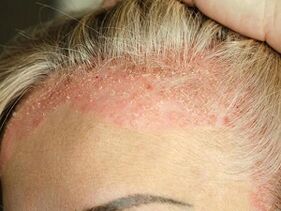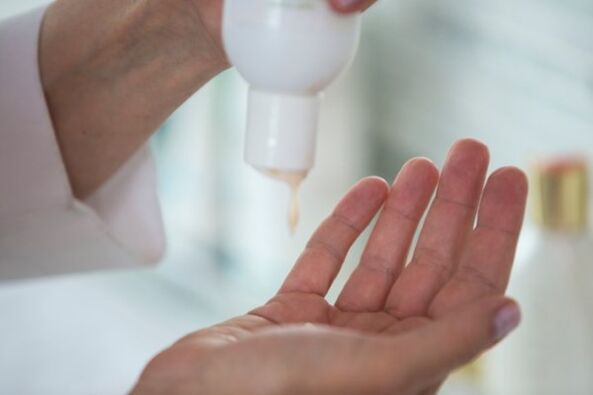Psoriasis, or squamous lichen, is a recurrent dermatological disease. It affects various parts of the body. Scalp psoriasis is common. An exacerbation of the disease is accompanied by symptoms such as itching, the appearance of red rashes and profuse peeling of the skin.
Reasons for development
The causative agent and the mechanism of development of squamous lichen are unknown to science. Presumably, the pathology is associated with impaired immunity. Since psoriasis is more common in people whose relatives suffer from the disease, researchers don't rule out hereditary links.
Scaly lichen can be caused by:
- viral and bacterial infections;
- allergic reactions;
- diseases of the endocrine system;
- pathology of the digestive system;
- disorders of metabolic processes.
The causes of exacerbation of psoriasis of the scalp are capable of such reasons as:
- severe or prolonged stress;
- drinking coffee, chocolate, cakes and pastries;
- bad habits: alcohol and smoking;
- mechanical damage to the skin;
- hypothermia;
- taking non-steroidal drugs, beta-blockers, lithium preparations.
In most patients, hair psoriasis occurs with a combination of several factors, so doctors consider it a polyetiological disease.
Diagnostics

A dermatologist is involved in identifying the squamous lichen. The initial stage of psoriasis can be determined by visual examination.
The main method of diagnosing psoriasis is considered to be scraping from the damaged area when using a slide, as well as analyzing the existing signs - phenomena, psoriasis, which are called the psoriatic triad.
A characteristic symptom of the disease is the psoriatic triad - the presence of punctate bleeding, stearin stain and terminal film.
In advanced cases, scalp psoriasis can be confused with other skin conditions.
To clarify the diagnosis, it is necessary to perform a skin biopsy and donate blood for analysis.
Treatment
To achieve a stable remission in psoriasis, it is necessary to treat it comprehensively. This includes: medicines, the use of special cosmetics, physiotherapy, visits to health resorts, folk remedies and other activities.
Medicines
There is a wide variety of topical and systemic medications available for the treatment of scalp psoriasis. The selection of drugs depends on the stage of the disease, as well as on the personal preferences of the patient and doctor.
Treatment of mild to moderate psoriasis is done with external drugs. The advantage of topical therapy is that there are fewer side effects. In severe cases, the dermatologist uses more toxic aggressive drugs, including systemic drugs.
Local therapy uses:
- birch tar;
- salicylic ointment;
- ichthyol ointment;
- preparations containing panthenol;
- antihistamines;
- glucocorticosteroids;
- vitamin D analogues;
- dithranol;
- occlusive dressings with drugs;
- retinoids;
- calcineurin inhibitors;
- emollients.
The complex of systemic therapy can include:
- antihistamines;
- non-steroidal anti-inflammatory drugs;
- retinoids;
- calcineurin inhibitors, which have an immunosuppressive effect;
- nonspecific immunomodulators.
Taking cytostatic drugs and corticosteroids is advisable in cases where other methods of treating scalp psoriasis have failed. If the skin becomes infected, as well as the manifestation of concomitant diseases, the doctor may prescribe antibiotics. Often the treatment of psoriasis is accompanied by the appointment of enterosorbents, sedatives and vitamins.
Form of release of systemic drugs: injection, powder, tablets, oral drops, spray or syrup.
Medical cosmetics

You can find an effective remedy for scalp psoriasis treatment using special cosmetics.
The most popular are medicated shampoos. Gently, without side reactions, they cleanse the skin affected by horny scales, soften it, reduce inflammation and also eliminate itching.
Deciding what to wash your hair with psoriasis should be based on the effects of the shampoos. They must have the full effect of eliminating pain and restoring coverage.
Based on a number of measures that have a tool taken separately, it is possible to determine the adequacy of its use or to give preference to a more effective shampoo.
Psoriasis shampoos can be divided into several conditional groups.
With zinc pyrithione
Activated zinc pyrithione effectively fights harmful bacteria - streptococci and staphylococci, as well as some types of fungi.
with tar
Shampoos contain refined birch, pine, juniper or willow tar. It has a keratoplastic effect, prevents excessive cell proliferation, works as an antiseptic.
With ketoconazole
Some drugs contain ketoconazole, an antifungal agent. Although the instructions do not mention psoriasis, many patients notice a positive effect after washing their hair with shampoo with this substance.
In addition to the above, pharmaceutical hair cosmetics can include: urea, salicylic acid, ichthyol, selenium sulfide, climbazole, ciclopirox and other components. You can not wash your hair with such shampoos on an ongoing basis - the course of treatment is regulated.
Physiotherapy procedures
Physiotherapy is an integral part of the complex treatment of scalp psoriasis. It is prescribed during the period of extinction of clinical signs and the onset of remission. There are several methods that can improve the patient's condition.
cryotherapy
Cryotherapy - exposure of the skin to ultra low temperatures (-140 to -160 ° C). Organs and tissues are stressed, a chain of biochemical reactions is triggered and various processes are regulated, including the autoimmune one. Under the influence of liquid nitrogen, cell regeneration is enhanced, the formation of scales is blocked, psoriatic plaques disappear.
Contraindications: pathology of internal organs and blood vessels, exacerbation of chronic diseases, cold intolerance, claustrophobia.
Phototherapy
Phototherapy - spectral irradiation of psoriatic plaques with ultraviolet rays. The procedure has an immunomodulatory and anti-inflammatory effect, reduces the rate of cell division. There are several types of phototherapy:
- photochemotherapy (PUVA);
- selective phototherapy;
- laser exposure.
They are all effective in treating scalp psoriasis. A concentrated beam of light is absorbed by cells with high fungal activity, which leads to their destruction and death.
Contraindications: diabetes mellitus, tuberculosis, persistent hypertension, poor blood clotting, oncology, epilepsy, pregnancy, keloid scars, viral diseases, kidney disease, sixth skin phototype.
Spa treatment

2-3 months after the drug, it is recommended to continue the treatment of psoriasis in the sanatorium. It is important to know that it is not possible to visit places of care during an exacerbation of the disease: the stage of regression should arrive.
Spa therapy can include:
- Heliotherapy - sunbathing.
- Aerotherapy - stay in clean air.
- Thalassotherapy - treatment with sea water.
- Balneotherapy - procedures using mineral waters (alkaline, hydrogen sulphide, iodine-bromine, rhodonic, siliceous).
- Peloid therapy: the effect of therapeutic mud.
The condition of many patients improves after a climate change. Being by the sea or relaxing in resorts will help you forget about the manifestations of psoriasis for a long time.
Folk remedies
Traditional medicine recipes can be used to treat and prevent scaly lichens. The advantage of natural ingredients is their relative safety for the body. To reduce the frequency of exacerbations, the following methods can be used:
- Mix 1 tbsp. L. baking soda with 4 tbsp. L. water, rub into the scalp, wait for it to dry and rinse with warm water. This solution has a softening effect and relieves itching.
- Grind a ripe banana with the peel with a blender, spread the mixture on the areas affected by psoriatic plaques and rub into the skin. After 20 minutes, wash off the mask with warm water. Banana pulp relieves inflammation and itching.
- Add 2-3 drops of tea tree oil to a portion of the medicated shampoo, apply on the hair by massaging the scalp, after 5 minutes rinse in the shower. Regular use of oil, which has antiseptic properties, allows you to eliminate the manifestations of psoriasis.
- Dissolve the sea salt in a little water, apply to the affected areas, leave for 30-40 minutes, then rinse. This procedure can be repeated several times throughout the day.
- Mix equal parts of salt with white or blue clay, add a little apple cider vinegar - so that the consistency of sour cream is obtained. Lubricate the psoriatic plaques with the mixture, massage gently and leave for 2 hours.
Traditional recipes shouldn't replace basic medical care. They play a supporting role and are used in complex therapy and not alone.
Preventive recommendations
With psoriasis of the head, you need to take care of your skin. The hairbrush should be soft and the brushing movements should be smooth and neat. In this way, damage and infection of open wounds can be avoided.
Styling products, curlers and flat irons should be avoided. Do not use coloring, as chemicals irritate the epidermis and can lead to an exacerbation of the disease.
It would be nice to get rid of bad habits. Alcohol and smoking adversely affect blood vessels, disrupt blood circulation, worsen skin nutrition and reduce the effectiveness of therapeutic measures.
Doctors recommend reviewing the diet and excluding smoked meats, chocolate, pickles, white bread, tomatoes, spicy foods, carbonated drinks, as well as strong coffee and tea.
It is important to avoid stress and maintain a healthy daily routine. Adequate sleep is the key to good health, as this process triggers self-healing mechanisms.
Unfortunately, psoriasis cannot be completely cured, because it is a chronic disease. However, with proper care of the scalp, adhering to the above rules, it is possible to minimize the number of relapses.
























